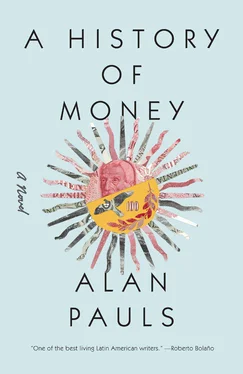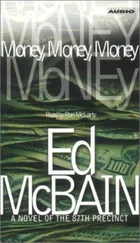Every time they leave, tan and feeling the contented exhaustion and strange expert youthfulness that six weeks of sea and leisure work on their bodies, and she turns around in the car and sees the house receding and being swallowed by the trees again, like a film shown in reverse, she has the unsettling feeling that she’s leaving a precious gem out in the open, unprotected and at the mercy of whoever finds it first. This feeling, along with a few robberies in the area, convinces them to hire house sitters. A Uruguayan woman who lives in the neighborhood advises them to look for a couple (since single male house sitters tend to slovenliness and alcohol, especially in the winter, when the only living beings prowling the area are stray dogs and toothless old hippies who’ve lost their way), and tells his mother’s husband he should employ them legally, paying all the necessary taxes and insurance, more because of the risk of inspection than out of any particular commitment to social ethics. Three months later, after a decidedly unrigorous interview process that his mother and her husband use primarily as an excuse to escape Buenos Aires, a jovial sort of family — in the stifled, Uruguayan vein of joviality, and with two antisocial but hyperactive kids — moves into the ground floor of the Beast, where they will live for almost a decade as taciturn witnesses to a decadence to which they never draw attention, no doubt because they fear that the first step toward curbing it would be to fire them, but which they see perfectly clearly from the very beginning.
There’s a change of government in Uruguay, and the incoming authorities, finding themselves in need of money, reappraise local tax rates throughout the country and then launch a ruthless attack on holiday resorts, where they know there’s a glut of easy and, moreover, foreign money. Municipal taxes suddenly skyrocket. Water, which had previously been practically free, is now pure gold. The weather rebels. There’s a series of inclement, treacherous summers, with furious downpours of rain that always catch them out just as they arrive at the beach, forcing them to change their plans and turn around, and then clear to reveal flawless, sunny skies just as they pull the car up to the garage back at the house, resigned to waiting it out. They’d console themselves with the pool, now that the problem of its inexplicable structural incline has been resolved ( rugby guy! ) and it’s possible to fill it properly with water — except that the brand-new owner of the adjoining property’s ruthless tree-felling (which they were the first to celebrate, thinking they’d get a much better view without having to spend a single penny) has made it unusable, like a runway, a tunnel for an anarchic wind that constantly threatens to break into a storm.
They begin to go less often, and for fewer weeks at a time. The Beast grows resentful. A particularly rainy winter (along with a not-entirely-legal new construction growing a little higher up the slope, held up by rickety scaffolding) unleashes an avalanche of mud, rubble, and a few unsuspecting construction workers, burying part of the right wing of the house and exposing a certain inherent weakness in the foundations ( rugby guy! ), which let in much more humidity than they should, resulting in an unavoidable process of excavation and resealing that lays claim to tons of money (though money is always measured in tons when something needs to be fixed), as well as a summer and a half (measured by the Uruguayan clock) of use of the house. They start to lose their tempers. They’re burgled (while one of the sitters is in the house: they lock her in the laundry room, and the children, who are in the garden tempting guinea pigs out of their burrows with insecticide tablets, don’t even realize what’s happening). They hear a rumor that someone’s planning to build a B and B for backpackers on the spot that’s home to a grove of magnolias they love. It gets harder to find friends to go with them. The windows cloud over with salt residue: all they can see at breakfast is a sad, lumpy white veil, with the sea and the coast and the little terra-cotta tiled roofs behind it in a blur, like an old postcard of a forgotten place. The house is huge, pointless, impossible to heat. Drafts whip through every door and window. When a shutter (one of the beautiful Mediterranean shutters the rugby guy campaigned for so ardently) comes loose and begins to flap, they can spend up to twenty minutes trying to track it down, frozen stiff. Sometimes — usually at night, when they’re beset by the terrible insomnia that strikes during vacations and they each withdraw to contend with it alone, ashamed, like injured animals — they feel as lost and alone there as intruders.
When they’re on the brink of going bust (if only they had a company that could go bust, or anything more tangible than the chaos of blind transactions, financial juggling acts, hopeless business prospects, and ever-more-meager accounts that now constitutes their respective inheritances) and sick of their money disappearing into the Beast, which swallows it as regularly as Sonia receives her remittances from the beyond, they decide that it’s time for the house to give some money back. They don’t have any grand ambitions. They’re not hoping to get rich. They just want it to pay for itself. Someone — probably a prompt hired by the former rugby coach — suggests that they convert it into a time-share complex. When they call him to discuss, the former rugby coach turned architect and now apparently mind reader, since he seems to have known all about it before he’s even picked up the phone, unfolds the plans (which he mysteriously has with him) and, in a tone of boundless enthusiasm, details a plan for remodeling. That’s what he says: remodeling. He’s planned for every eventuality; the most important thing to him is to put their minds at rest from the start. Since it’s so spacious and generously proportioned — it’s almost as though he foresaw this the first time he drew it! — nothing needs to be added to the house, not a single brick — except, of course, what’s required by the current regulations on time-share apartments: communal spaces; three, or maybe two, yes, just two more tiny little bathrooms; the extra sixteen square meters they’ll need to add to the pool; and parking spaces — crucial: who would stay all the way up there without a car? — for half a dozen vehicles. They’ll work with what they have. Divide up what’s already there. They could get half a dozen apartments out of it, and the seventh, a duplex, the best and most expensive apartment in the development, would be theirs for three weeks of the year, whichever they liked, and they wouldn’t have to pay a penny. Construction can start today, now, yesterday even, if necessary. The ex-rugby guy happens to have some people in the area ready to work — a Filipino-style bungalow complex that had to be abandoned because of a little financing hiccup. It’d be as simple as sending them to the Beast instead. When could they get the advance together so work can start?
The project is a failure. They plan to open in December, in time for high season, with a view to quickly earning back the cost of the work. But a nasty winter, legal setbacks that are slow to work themselves out (rugby guy’s contact at town hall having been arrested for the little matter of corrupting minors), and rugby guy’s disappearance for a month and a half — which he says he spends in a foul-smelling hospital in Maldonado being treated for a string of lung collapses, but which according to the house sitters, who bump into him twice at the currency exchange in town, he spends holed up in the casino, wearing flip-flops, tinted glasses, and a floral shirt bearing the bungalow complex’s logo; wherever he is, it’s a long way from the construction work, which grinds to a halt, inspiring a furious union protest, complete with two days of peaceful occupation of the Beast and the smell of chorizo sausages in the complex’s future lobby — all combine to delay the cutting of the ribbon until the chilly month of May, when only an outlaw on the run would rejoice at the prospect of a stay in a time-share on the Uruguayan coast, and thus begins the saddest case of lost profits in the history of summer architecture.
Читать дальше












